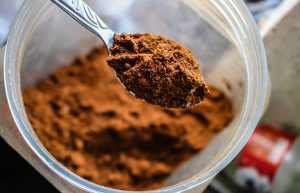 You see them everywhere, protein powders and shakes. They were at one time strictly in supplement and health food stores, but now are on grocery shelves, discount stores and pharmacies. To make it more confusing, there are protein drinks and powders of all kinds. There are ones for seniors, ones for bodybuilders and ones for vegetarians. Are they a waste of money? Dangerous? Or truly beneficial? For seniors, the answer might be yes, since the ability to use protein efficiently diminishes with age. How vigorously you exercise and your weight and muscular development also play a role.
You see them everywhere, protein powders and shakes. They were at one time strictly in supplement and health food stores, but now are on grocery shelves, discount stores and pharmacies. To make it more confusing, there are protein drinks and powders of all kinds. There are ones for seniors, ones for bodybuilders and ones for vegetarians. Are they a waste of money? Dangerous? Or truly beneficial? For seniors, the answer might be yes, since the ability to use protein efficiently diminishes with age. How vigorously you exercise and your weight and muscular development also play a role.
Your protein intake varies by a number of factors.
If you’re female, you need less protein than a male. Your body weight also plays a key role in the amount of protein you need. The more you weigh, the more protein you require. If you aren’t using your muscles, like exercising, which can cause micro tears, you don’t need as much protein as an active person. Protein is used to help repair those tears and build more muscle mass. Someone with an intense workout schedule, like an athlete, needs the most. As noted previously, aging can also cause a need for more protein.
In the United States and other developed countries, protein deficiency isn’t a wide spread problem.
Marasmus, Kwashiorkor, inherited conditions and Cachexia are protein deficiency diseases. Marasmus and Kwshiorkor come from dietary lack of protein. Their symptoms include irritability, fatigue, lack of growth, diarrhea and impaired or stunted cognitive functioning or mental health issues. Lack of protein is most often seen in third world countries, especially during famine, when food is hard to find. On the other end of the spectrum, you can have too much protein. It can occur when you eat more than 2.2 grams per kilogram of weight over an extended time. Symptoms are dehydration, exhaustion, nausea, headache, irritability, with severe ones being kidney disease, seizures, blood vessel disorders, cardiovascular and liver disease that can result in death.
You probably don’t need any protein supplement or shake if you have a healthy diet.
There’s no harm in drinking a protein shake occasionally, but you should never do it to replace a healthy meal. A little extra protein may be good if you’re older or have a tough workout schedule. You don’t need to sprinkle on protein or add extra protein at every meal. Unless your health care professional advises otherwise, limit the additional protein supplements and simply eat healthier.
- Every part of the body uses protein as building blocks. The body needs it to make skin, muscle, bones, cartilage and blood.
- If you’re trying to lose weight, protein can help. Boosting your protein intake will make you feel fuller longer. You don’t need supplements to do that and can get that from eating regular food.
- One of the drawbacks of consuming high amounts of protein is the bad breath it causes. It’s the type of breath that doesn’t disappear from brushing your teeth or using mouthwash.
- One of the biggest problems with protein shakes or supplements is that people use them to replace food. That means they don’t get all the nutrients a more traditional meal could supply.
For more information, contact us today at LIV Fitness
